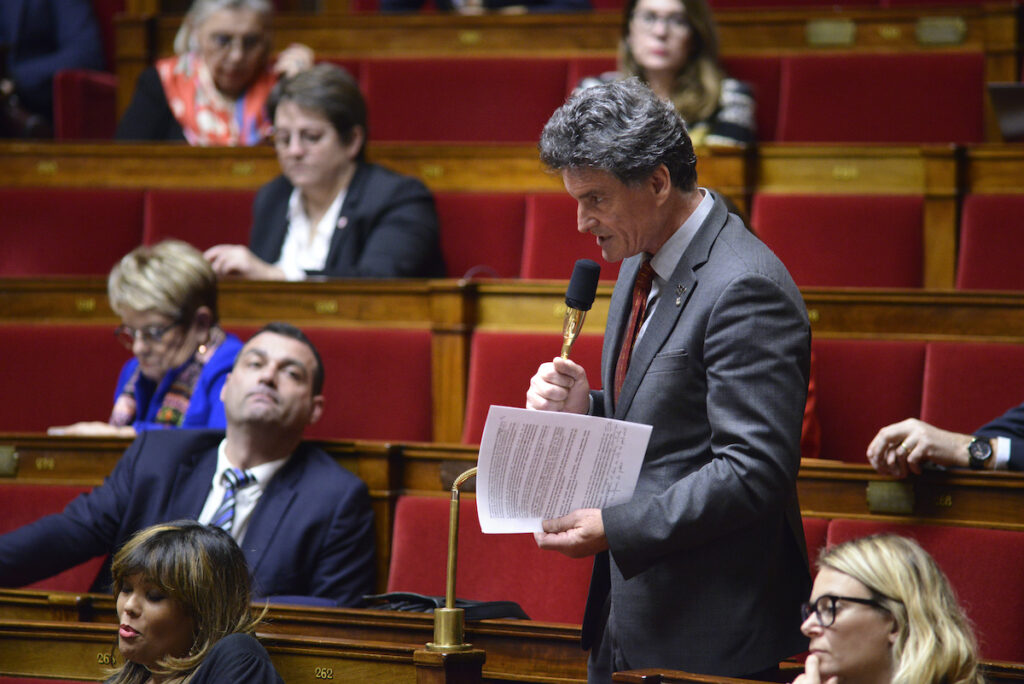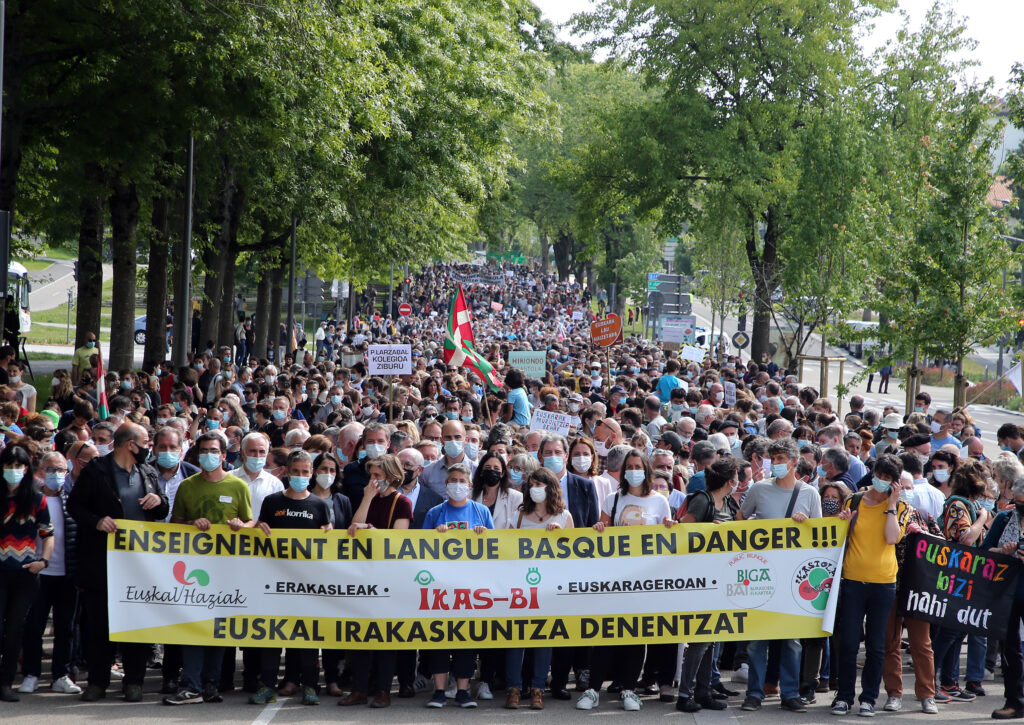by Idoia Eraso
The French Constitutional Court declared last May 2021 that the system offering education entirely in a minority language is unconstitutional. This decision caused such a social and political stir, that the Ministry of Education was forced to back down. It did so through a notice published on December 16th, where it establishes that it is allowed.
The political journey that ended in this December notice began on February 13, 2020 when the Breton congressman Paul Molac of the Libertés et Territoires (freedoms and territories) group presented in the French National Assembly the bill on the patrimonial protection and promotion of regional languages, which has been known since then as the Molac Law. After being adopted in the Senate and the National Assembly, the Constitutional Court ruled that two of its articles were unconstitutional, the most important being the one cited on education.
The law aimed to grant certain rights to the 75 minority languages that coexist in France, which in the French mainland are mainly Basque, Breton, Corsican, Occitan, Catalan and Alsatian. All of them have a system of associative schools that offers learning entirely in the language of each region, such as that of the federation of ikastolas (schools in Basque language) called Seaska in Iparralde (Northern Basque Country). Today in France more than 380,000 students study in minority languages, both in public and private schools, in the bilingual system or also called the immersion system. Among them 15,000 do it in associative schools, of which more than 4,000 are a part of Seaska.
What has made this law necessary, and makes France one of the least respectful of its minority languages in all of Europe, is the second article of the Constitution that states that “French is the language of France”. An article that is a source of confrontation, and against which, after this conflict, the voices that call to change it are being heard increasingly louder. The policy of linguistic annihilation shown in this article has had serious consequences, since all the languages of the French mainland are at risk of extinction, including Basque, despite being the only language not decreasing in speakers.

The Molac Law
The bill presented by Molac dealt mainly with legislating bilingual signage, the possibility of registering the proper names of the regional languages with their respective diacritics in the civil registry, even if they are not part of the French alphabet (as is the case of the “ñ” in Basque), and education. The latter has been the main source of conflict from the outset.
At the first reading in the National Assembly, six of the nine articles presented were withdrawn, among which were all those linked to education. It was a vote with a very low turnout, with no congress members from Iparralde participating. On the contrary, the Minister of Education Jean-Michel Blanquer, a declared enemy of minority languages, participated in the parliamentary discussion and was opposed to all the articles linked to this topic.
In December of the same year, against all odds, the Senate restructured the bill, and included several articles related to education. This was thanks to great lobbying work carried out by several senators, among whom were the Basque representatives Max Brisson and Frédérique Espagnac.
After this victory, new hope was born and a great deal of work was done to inform and pressure the congress members, leading up to the vote at the second reading in the National Assembly. Unlike in the first vote, the turnout was very high, this time all the Basque members of congress participated in the vote and voted in favor. With 247 votes in favor and 76 against, the bill was adopted into law on April 8, 2021.
Despite the fact that the law was contrary to the will of the Government, as stated by the Minister of Education at the first reading, they assured that no appeal would be submitted. But when there were only a few hours left before the deadline to appeal, 60 members of congress belonging to Emmanuel Macron’s government party (la République en Marche), filed an appeal with the Constitutional Court, specifically regarding the article about the municipal financing of immersion education.
Soon, it became known that the appeal had been drafted in the office of the Minister of Education, and later, several members of congress who had signed the injunction publicly declared that they did not agree with it, and that they had been tricked into giving their signatures.
The Constitutional Court did not take these statements into account and considered the appeal. The Court did not object to the article under appeal, but on May 21st it declared unconstitutional linguistic immersion education and the use of diacritical signs in the civil registry.

Reactions to the Decision of the Constitutional Court
From the very beginning the decision created a large stir. Elected officials from all over the State and institutional representatives showed their anger, as did social representatives. One hundred forty parliamentarians from all territories sent a letter to President Emmanuel Macron, asking him to change the Constitution, among them were all the Basque members of congress and senators. On May 29th, a simultaneous, national demonstration was also held, and in Bayonne, 10,000 people participated.
One of the specifics of the decisions of the French Constitutional Court is that in many cases, a few weeks later it usually publishes an official notice to give some clarifications about the resolution. In the publication on June 17th regarding the Molac Law, it was specified that the declaration of unconstitutionality referred only to public education. Several days later, the Constitutional Court published a new commentary in which it declared that it was unconstitutional in all kinds of education.
In an attempt to calm the situation, the Government asked the congress members Christophe Euzet and Yannick Kerlogot for a report on teaching in the language immersion system. It was presented to Prime Minister Jean Castex on July 21st, and was declared a huge disappointment by the proponents of this kind of education.
Meetings then began between the Government and the educational representatives, accompanied by the elected defenders of the languages of their respective territories. From Iparralde the participation of Antton Curutcharry, president of the Public Office of the Basque Language, and Peio Jorajuria president of Seaska has been key.

The beginning of the school year was an important moment of social and political pressure. In Iparralde, despite the declaration of unconstitutionality, more classrooms were opened than ever for teaching entirely in the Basque language in public schools and private Catholic schools, and a new ikastola was also opened in the town of Bardoze.
The Government reported that the Ministry of Education would issue a notice to specify how the constitutional decision should be implemented, considering the requests made during meetings with representatives of the different regions.
Finally, the expected notice came in December, and it was declared that the immersion system is a possible strategy to learn a minority language, thus invalidating the prior Constitutional stance. It has even improved the situation prior to the declaration of unconstitutionality, since it establishes that in the public system, immersion in a minority language is also allowed in secondary schools, which was not possible until then.
Despite the good news of the notice, political, associative and educational representatives have stressed that it is only a document, so it has limited value, and that it is still necessary to change the Constitution to ensure the rights of minority and minoritized languages in France.


Eskerrik asko Idoia, artikulo interesgarria, benetan.